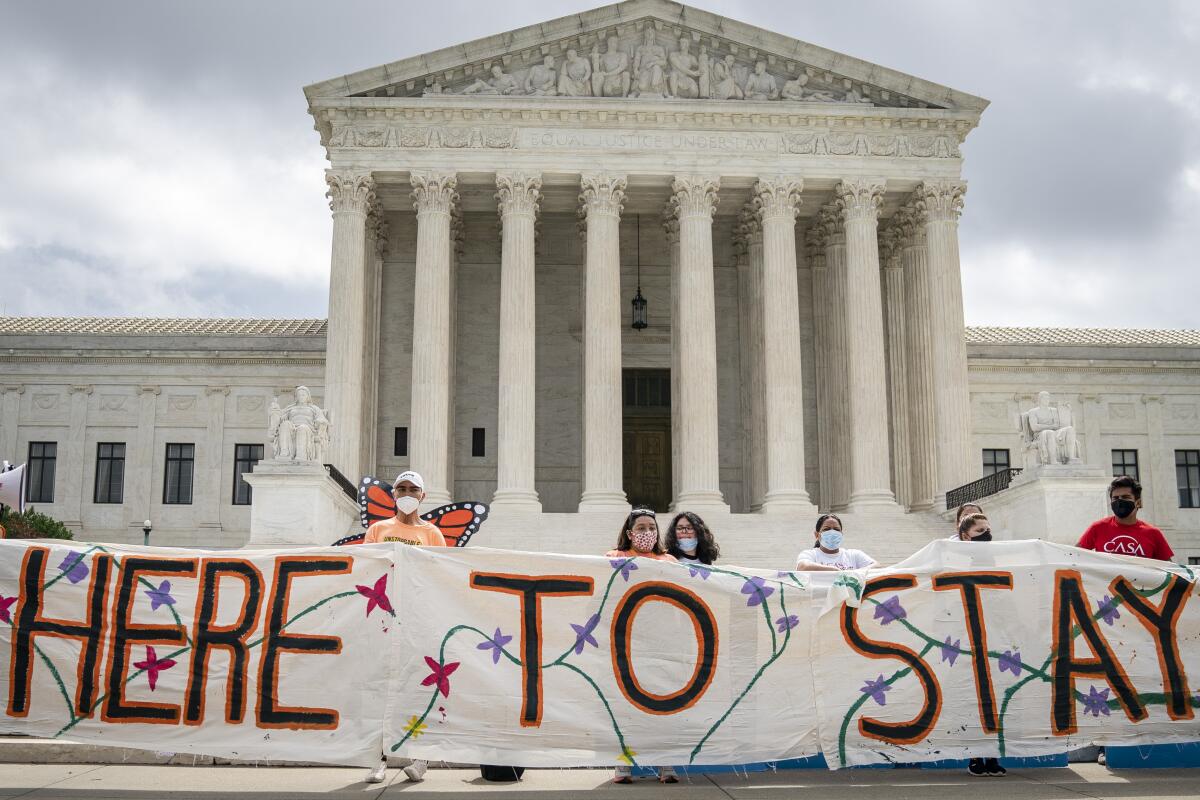Newsletter: Essential California Week in Review: The court says no

- Share via
Good morning, and welcome to the Essential California newsletter. It is Saturday, June 20.
Sign up for Essential California
The most important California stories and recommendations in your inbox every morning.
You may occasionally receive promotional content from the Los Angeles Times.
Here’s a look at the top stories of the last week:
Deeper probes promised. The deaths of Robert Fuller in Palmdale and Malcolm Harsch in Victorville are gaining new attention, including from the FBI. Atty. Gen. Xavier Becerra is sending investigators to help probe Fuller’s death, and Harsch’s family said Friday he appeared to have died by suicide, after earlier saying that did not seem plausible. Both men were Black and were found hanging from trees.
Fuller’s brother killed. Days after Fuller’s death and the announcement of an investigation, Fuller’s half brother, Terron Boone, was killed by Los Angeles County sheriff’s deputies in a shootout, leading to more questions.
The Antelope Valley’s troubled past. The area that includes Palmdale and Lancaster has a significant Black population, but residents say racism runs deep. They describe troubling encounters, run-ins with skinheads and being pulled over by police without explanation so often that they avoid some roads.
The court says no. On Monday, the Supreme Court refused to hear the Trump administration’s challenge to a California “sanctuary” law, leaving intact rules that bar law enforcement officials from aiding federal agents in taking custody of immigrants.
The court says no, again. On Thursday, the Supreme Court rejected President Trump’s plan to repeal DACA. California is home to more DACA recipients than any other state. Some rejoiced at the news, but others were more cautiously optimistic.
Police or policy? Officials are responding to weeks of protests over racial injustice with legislation and policy ideas that would offer alternatives to police. Several Los Angeles City Council members proposed a new emergency-response model that uses trained specialists, and the Los Angeles Board of Education is set to consider phasing out the school police.
Is affirmative action back? More than two decades after it was outlawed at public campuses, University of California regents on Monday unanimously supported the repeal of Proposition 209. Voters may have the final say in November.
Masks required. Gov. Gavin Newsom on Thursday ordered almost all Californians to wear face coverings while in public or high-risk settings. The move came as California’s coronavirus cases and hospitalizations rise and as Orange County rolled back its mask requirements.
Illegal evictions. Despite new anti-eviction rules, some Los Angeles landlords are still trying to oust tenants by locking them out of their homes, turning off their utilities and deploying other illegal methods, a Times analysis found. And it’s happening largely in Black and Latino neighborhoods.
A guilty plea. PG&E pleaded guilty to killing 84 people in a devastating 2018 wildfire that virtually wiped out the Northern California town of Paradise in November 2018 and was ordered to pay $4 million for its role. Separately, a bankruptcy judge said he would approve the company’s reorganization plan, though it’s unclear if there’s anything fundamentally different about the utility.
Enjoying this newsletter?
Your support helps us deliver the news that matters most. Become a Times subscriber.
This week’s most clicked stories in Essential California
1. Bottle servers popped out of caskets at one L.A. club’s reopening brunch. Los Angeles Magazine
2. “After great pain, a formal feeling comes” by Emily Dickinson. Poetry Foundation
3. Sign up for The Wild, our new newsletter about the great outdoors. Los Angeles Times
4. Can you travel in California? Official signals conflict. Los Angeles Times
5. “I Know a Man” by Robert Creeley. Poetry Foundation
ICYMI, here are this week’s great reads
They lost loved ones to police violence. George Floyd’s killing has made the pain new again. Los Angeles Times
Elizabeth Alexander on why she calls the young people who grew up in the last 25 years the Trayvon Generation. “They always knew these stories. These stories formed their world view. These stories helped instruct young African-Americans about their embodiment and their vulnerability.” The New Yorker
More than a meal: Restaurants aren’t just places to be fed; they offer a theater of experience. Here, several renowned writers recount some of their most memorable meals out. New York Times
Poem of the week: “Funny” by Anna Kamienska. Thrive
Please let us know what we can do to make this newsletter more useful to you. Send comments, complaints, ideas and unrelated book recommendations to Julia Wick. Follow her on Twitter @Sherlyholmes. (And a giant thanks to Laura Blasey for all her help on the Saturday edition.)
Sign up for Essential California
The most important California stories and recommendations in your inbox every morning.
You may occasionally receive promotional content from the Los Angeles Times.




